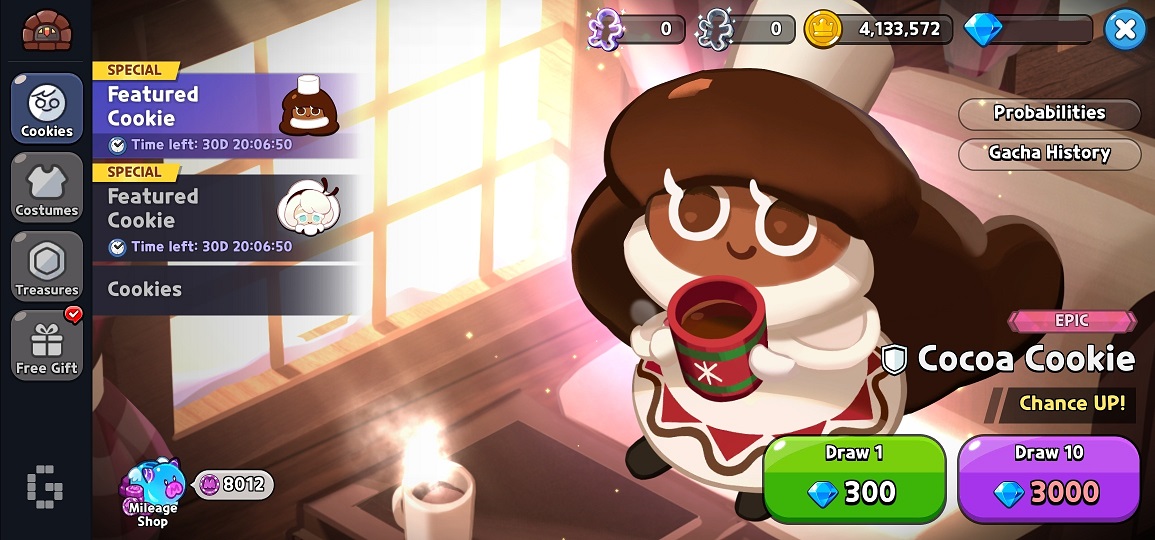This article on “Pity or No Pity” regarding guarantee systems in gacha games was available earlier as part of the GamerBraves newsletter. Subscribe to it for free for insights on the games industry and community at large.
Games with random loot mechanics are nothing new. Monetizing this randomness has become more common, as we can see in loot boxes and, today’s topic, gacha games. After a casual look-through of a certain Reddit thread, first thing’s first: what’s your choice between A. a game generous with currency but without a guarantee system, or B. a game that’s not necessarily generous but has a guarantee system?
Preliminary results in the aforementioned thread suggest that a majority will prefer the guarantee system – often colloquially referred to as a “pity” or a “spark” – over generous gifts. Nonetheless, there are people who would opt for more currency instead, forgoing that guarantee. On this occasion, the ratio stood at roughly 2:1, which could be surprising to some.

In fact, in our very own newsletter poll, readers opted for a generous game over a guarantee, in a twist of fate (or the roll of a dice?). Let’s play both sides first.
| YES TO GUARANTEE | NO TO GUARANTEE |
|---|---|
| Getting what you want | “More rewarding” when you hit the jackpot |
| Better planning, typically leading into lower spending where applicable | The single guaranteed copy isn’t necessarily “complete” |
| Encouraged to continue playing due to getting desired target | You’ll always have currency for the next release |
PITY PLEASE!
Ensuring you get your desired target is always a nice feeling, that no matter how bad it gets, you’ll get it. It arguably encourages self-discipline, where you hold back until you’re 100% sure you want whatever it is, and that you WILL get it. The actual amount required for the guarantee can differ from game to game, potentially up to 300 or 400 draws total, which could be quite lofty goals for a free-to-play player.
This can be seen as a badge of honour. Every now and again, you might come across people declaring how much they’ve saved for a particular unit – or even just for the potential release of a unit – with community members cheering them on in their quest, asking how long they’ve been saving, or how much they’ve done to amass their hoard.

While this sounds well and good, there can be perceived downsides to this system. Take for example, a low currency gain, so that it becomes “mandatory” to log in everyday to eke out every source of currency available to you. The safety net becomes a double-edged sword, a suggestion that you should spend just that little bit more because you’re guaranteed something good, right? Just a few dollars will do.
GENEROSITY?
It can be easy to see the “generous currency” crowd as more “emotionally driven”. As one comment puts it, “I play gacha for the gacha”. Sometimes you just want to scratch that urge to do that pull, and if the game is generous, you can do so without spending anything and not threatening to spend beyond your means. If you get lucky, great. If not, try for the shiny next time.
In unpacking the “incomplete” nature of the guarantee system, this suggests that the guaranteed copy you get is, as implied, “not the full package”. To put it simply, you could still be missing out on additional upgrades that require duplicates. Common terms referring to duplicate upgrade systems include “uncapping” or “limit breaking”, as in raising an upper limit. How much a unit changes depending on how many copies you obtain can range anywhere between minor improvements that may only come into play in “high level challenges” (e.g. min-maxing), or completely transforming their playstyle.

It’s worth mentioning that not all “uncap” systems will strictly require duplicates, as it is common for games to have multiple flavours of “uncaps”.
A “WASTED PULL”?
In this aspect, Genshin Impact’s system shines. Every single pull / draw adds up to the “pity counter”, carrying over across applicable banners (Genshin refers to them as “Wish Events”, e.g. a featured draw promotion) and only resetting once you hit the guarantee.
In Genshin’s case, a 4-star is guaranteed in every 10 draws. If you get it within, say, 1 draw, great! If, after 9 consecutive draws you still haven’t gotten a 4-star, you WILL get one at 10. Then, these draws will add up to the 5-star pity, obtainable at a maximum of 90 draws for one 5-star character. A featured 5-star character is guaranteed at a maximum of 180 draws. When it adds to the pity counter, the perceived “waste” is “less” tangible.

WHICH SYSTEM IS “BETTER”?
For the player, a generous hand out of currency with a guaranteed pity system seems like the best case scenario. Epic Seven appears to fall in this category when it comes to obtaining a desired character, with player expenditure relegated to gearing up the characters instead (e.g. via equipment).
For the business, not having either sounds the preferred route for highest potential profit. Just look no further than Famitsu’s apparent editorial calling players who want a guarantee system “greedy”. There’s plenty of lamenting resulting from Fate/Grand Order, the harsh reality of its gacha being cited as a reason to quit the game.

While it’s easy to say that you could implement a “best of both worlds” system, there are still other factors to consider. Take but two: If it’s so easy to save up currency to get multiple copies of that high rarity unit, shock, horror, is it worth bragging about? If you give away so much currency, what supports your operational costs if people think there’s no need to spend anything?
Nonetheless, whichever system you decide to go for when monetizing randomness, this should be your one constant: you can’t go “full greed” to squeeze every penny out of your players. When there’s no more players, there’s no more money.
All in all, wanting a guarantee in a gacha is apparently more “divisive” than it initially seems. It must be said that the game is preferably generous for people to prefer the no-guarantee. There’s also the consideration of potentially getting free-to-play players to become spenders, should they be tempted enough by the pity system.
Whichever way it is, the business should avoid overdoing their monetizing. When players quit, there won’t be anyone left who would spend.


![[GUIDE] Mastering Clair Obscur: Expedition 33 – Essential Tips for Success](https://cdn.gamerbraves.com/2025/04/Expedition-33_Guide_FI-360x180.jpg)









![[SEA Exclusive] From Shadows to Shipwrecks – Jennifer English Talks About Bringing Emotional Depth to Clair Obscur: Expedition 33](https://cdn.gamerbraves.com/2025/04/Clair-Obscur-Jennifer-English_Interview_FI-360x180.jpg)

![[EXCLUSIVE] Do the Game Interview – An Intimate Look at the Challenges of Game Development](https://cdn.gamerbraves.com/2025/04/Do-the-Game_Interview_FI-1-360x180.jpg)
![[EXCLUSIVE] Interview with the Minds Behind of Den of Wolves – 10 Chambers’ New Sci-Fi Heist FPS](https://cdn.gamerbraves.com/2025/04/Den-of-Wolves_Interview_FI-360x180.jpg)









![[GUIDE] Finding Alma’s Lost Glasses in The Apple of Her Eye Side Quest](https://cdn.gamerbraves.com/2025/04/Alma-Glasses-Quest_Gudie_FI-360x180.jpg)



![[GUIDE] Farming Nightflower Pollen in Monster Hunter Wilds](https://cdn.gamerbraves.com/2025/03/MHWilds-Pollen_Guide_FI-360x180.jpg)